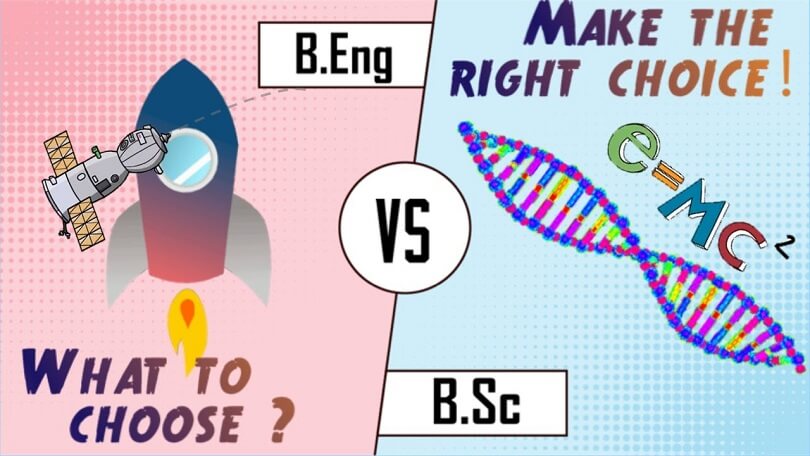Today’s students are having a tough time choosing on a professional route. Many universities and colleges now offer a wide variety of specialized courses and degrees. Student confusion is exacerbated by the prefixes that are attached to many degrees nowadays.
BSc and BEng are two examples of degrees that fall under this category.
Bachelor of Science (BSc) and Bachelor of Engineering (BEng) are two different degrees. It is true that these two programs have many similarities, yet their educational outcomes are quite different. Both of these degrees have a distinct purpose.
BSc Vs. BEng
BEng is more focused on engineering, whereas the Bachelor of Science degree is more focused on scientific research. The Bachelor of Science degree focuses on general science, whereas the Bachelor of Engineering degree focuses on engineering. Also, the BSc is more theoretical, while the BEng is more practical.
What is a BSc degree?
BSc stands for Bachelor of Science.
Most schools and institutions grant this degree, making it a common one. The term “Bachelor of Science” is used often by institutions to describe a wide variety of their degree programs. As this course covers a wide range of topics, interest in it is never-ending. Computer science, agribusiness, biology, animation, and so on are just a few of the career-oriented courses that may be found in a bachelor’s degree in science.
For science-based disciplines, it focuses more on providing extensive knowledge and comprehension of the topics covered. This degree is mostly theoretical in nature, but there is also a significant amount of hands-on training. Physics, Chemistry, or Biology are the three most common BSc disciplines. The student’s choice of specialty determines the other disciplines.
Two types of BSc degrees are available to students: BSc General and BSc Honors. Both of them are similar in many ways.
BSc Honors is a more structured degree that provides students with advanced theoretical and practical knowledge, while BSc General provides students with a fundamental understanding of the scientific areas they’ll be studying.
What is a BEng degree?
BEng stands for Bachelor of Engineering.
One of the most well-respected degrees in the world is an engineering one. Why? Because the newest technologies are developed in order to aid the development of nations.
The Bachelor of Engineering (BEng) degree is a common undergraduate degree in most countries. It’s available in Chinese, Australian, German, United Kingdom, United States, Singapore, and New Zealand universities and colleges.
Electrical Engineering, Civil Engineering, and Mechanical Engineering are all examples of engineering disciplines. There is a high need for engineers in the fields of aerospace, computer science, mechanical engineering, and electronics and communication.
This course of study is more hands-on in nature. They may be compared to BSC degree programs in that they are the complete opposite. A large amount of the academic curriculum is devoted to putting theory into practice, and students are exposed to theories as well. They’d benefit much from this, and it would help them prepare for the corporate world.
You may learn about a wide variety of engineering disciplines with this program.
If you’re looking for a long-term career in engineering, a Bachelor of Engineering (BEng) degree is a better option than a Bachelor of Science (BSc). Engineers will be in high demand as technology continues to advance, which is a given. As a result, pursuing a career in this field is certain to lead to a successful one.
It is possible to work as an Architect of Computer Hardware; a Development Engineer; a Quality Control Engineer; an Operator of Computers; and so on after finishing this degree.
This degree will always be relevant since the future is in technology.
Difference Between BSc and BEng
There is a difference between a BSc and a BEng degree.
- Jobs for BSc graduates are scarcer than for BEngs. BEng students are more likely to get a job than BSc students.
- To get a Bachelor of Science in Science (BSc) or Bachelor of Engineering (BEng) needs four years of study.
- Biology, chemistry, physics, and mathematics are the primary areas of study for BSc students. BSc, on the other hand, focuses on a wide range of subjects, including civil, mechanical, and computer science.
- The BSc degree is mostly theoretical, while the BEng degree is primarily practical.
Conclusion
Engineering and science have a lot in common at the undergraduate level. College and university programs last anywhere from three to five years, depending on the institution. Typically, a BSc takes three years to complete, whereas a BEng takes four years.
The Bachelor of Science degree focuses on general science, whereas the Bachelor of Engineering degree focuses on engineering.
It may be claimed that the breadth of BEng is greater since it is the knowledge of this degree that aids in the constant updating of technology. Engineers are in high demand, and this degree may help you get a good job.
In contrast, a bachelor’s degree in science (BSc) is an excellent alternative for people who want to pursue a career in teaching. You may pursue BSc if you wish to take competitive tests that can only be taken after graduation like bank examinations or civil service exams.

